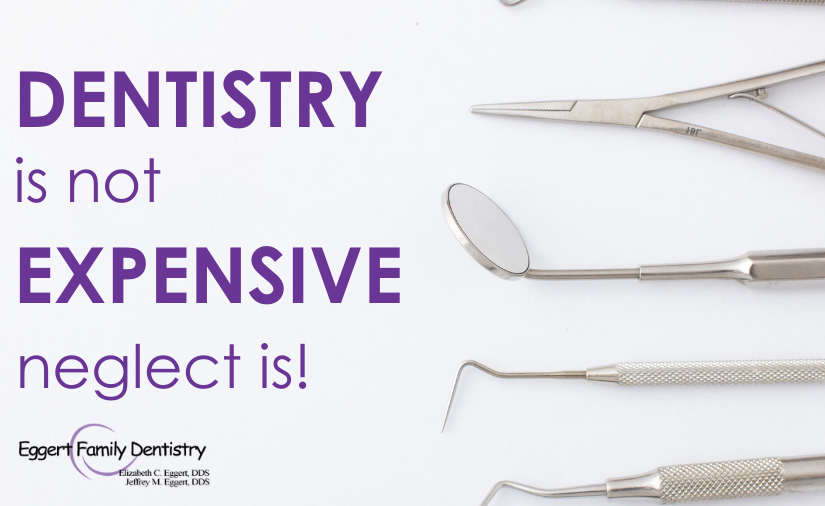By: Dr. Elizabeth Eggert
If you want to save money on dental care, invest in floss, toothbrushes and fluoride toothpaste!
The good news is that you can have a huge impact on how long you keep each tooth, and how healthy it is. When you take good care of your teeth, you defer or prevent the investment in dental procedures altogether. For some people, this is highly motivating. Whether you are motivated by money, vanity, or health concerns, we are here to help you take the best possible care of your teeth, which is the best way to avoid the cost and time involved with dental procedures.
Please follow these tips, and reach out to Dr. Elizabeth or Dr. Jeff if you have any questions about how to take the best possible care of your precious teeth and smile.
Brush Properly
It’s important to use good technique to get the most out of brushing. Remember to be gentle, move your brush in circular motions, and brush all surfaces. Better brushing means less plaque, less gum disease, and longer-lasting teeth.
Never Go To Bed without Brushing Your Teeth
The best time to brush is about an hour after you eat. The ideal practice is to brush after every meal and snack. However, many people shirk their brushing practice right before bed because they’re too tired. However, this is the most important brushing session, because any germs and plaque that remain on your teeth when you go to bed have at least eight hours or so to do their damage.
Brush Your Tongue
Plaque also accumulates on your tongue, which can this lead to bad breath and other oral health problems. Always gently brush your tongue each time you brush your teeth.
Use Fluoride Toothpaste
We recommend using fluoride toothpaste for best oral protection. It helps remineralize damage to enamel caused from bacteria and acid in your mouth.
Be as Dedicated to Flossing as to Brushing
Flossing removes stuck food particles, but it also stimulates the gums, reduces plaque, and help reduce gum inflammation. Please floss at least once daily. If you find it challenging to floss, look for alternate remedies such as disposable dental flossers.
Use Mouthwash
Mouthwash has multiple benefits, depending on the product, including reducing acid in the mouth, cleaning hard-to-brush areas in and around the gums, and re-mineralizing teeth. It’s particularly helpful for people who don’t do a great job of brushing, such as children and the elderly.
Eat Crunchy Fruits and Vegetables
Our teeth evolved to benefit from a workout, so it’s good for our jaws and teeth to eat crunchy, chewy things. Instead of soft processed foods, eat crunch raw vegetables and fruits, and whole grains. Giving your jaw a workout is good for your teeth and your breathing habits, too.
Avoid Sugary and Acidic Foods and Drinks
Acid erodes tooth enamel, which causes cavities. The bacteria in the mouth can also convert sugar to acid in the mouth. While few of us will give up all acidic foods such as coffee, tea, and fruit, be mindful of eating these things, and rinse after consuming them.
Drink Lots of Water
Water is good for your overall health as well as your oral health. It helps wash food residue and particles out of your mouth and reduce the impact of sticky and acidic foods and beverages. Drink water with your meals, and swish out your mouth a few times after your last bite.
See Us at Least Twice Yearly
Professional cleanings are a necessary component of dental care. It is not possible for you to be able to clean every area effectively on your own. We will also look for cavities and any other issues that may need treatment. Prompt treatment is the best way to minimize both discomfort and expense.

